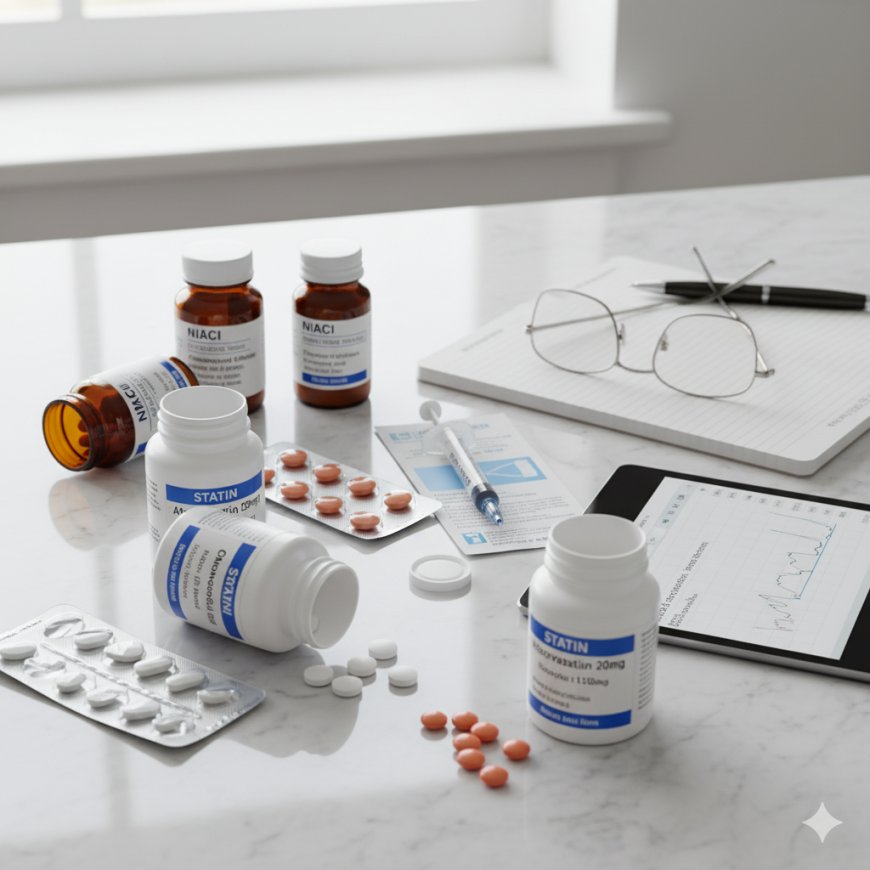High Cholesterol: Causes, Prevention, and Management
High Cholesterol: Causes, Prevention, and Management

High Cholesterol: Causes, Prevention, and Management
High cholesterol is a silent threat, often showing no symptoms until it leads to serious health problems like heart attack or stroke. It's a condition where you have too much "bad" cholesterol (LDL) and not enough "good" cholesterol (HDL) in your blood. This imbalance can lead to plaque buildup in your arteries, narrowing them and restricting blood flow. Understanding the causes, implementing preventive measures, and exploring management options are crucial for a healthy life.
What is Cholesterol and Why is it Important?
Cholesterol is a waxy, fat-like substance found in all your body's cells. It's essential for building healthy cells, producing hormones, and aiding in digestion. Your liver produces all the cholesterol your body needs, but you also get it from certain foods.
There are two main types of cholesterol:
-
Low-density lipoprotein (LDL): Often called "bad" cholesterol, high levels of LDL can lead to plaque buildup in your arteries.
-
High-density lipoprotein (HDL): Known as "good" cholesterol, HDL helps remove excess cholesterol from your arteries and transport it back to the liver for removal from the body.
Causes of High Cholesterol
Several factors can contribute to high cholesterol levels:
-
Unhealthy Diet: A diet high in saturated and trans fats, found in red meat, full-fat dairy products, fried foods, and processed snacks, can raise LDL cholesterol.
-
Lack of Physical Activity: Regular exercise helps increase HDL cholesterol and reduce LDL cholesterol. A sedentary lifestyle can lead to an unhealthy cholesterol profile.
-
Obesity: Being overweight or obese often leads to higher LDL cholesterol and lower HDL cholesterol.
-
Smoking: Smoking damages the walls of your blood vessels, making them more likely to accumulate fatty deposits. It also lowers HDL cholesterol.
-
Age: As you age, your cholesterol levels tend to rise. Men typically see an increase after age 45, and women after age 55.
-
Genetics: If high cholesterol runs in your family, you may be more susceptible to it. Familial hypercholesterolemia is a genetic disorder that causes very high LDL levels.
-
Certain Medical Conditions: Diabetes, kidney disease, hypothyroidism, and liver disease can all contribute to elevated cholesterol.
-
Medications: Some medications, such as certain diuretics, beta-blockers, and corticosteroids, can raise cholesterol levels.
Prevention: Taking Control of Your Cholesterol
The good news is that high cholesterol is largely preventable and manageable through lifestyle changes.
-
Eat a Heart-Healthy Diet:
-
Limit Saturated and Trans Fats: Choose lean meats, poultry without skin, and low-fat dairy. Avoid processed foods and excessive fried foods.
-
Increase Soluble Fiber: Foods like oats, barley, fruits (apples, pears), and vegetables (broccoli, carrots) can help reduce LDL cholesterol.
-
Include Omega-3 Fatty Acids: Found in fatty fish (salmon, mackerel), flaxseeds, and walnuts, omega-3s can lower triglycerides, another type of fat in the blood.
-
Eat Plant Sterols and Stanols: These substances, found in fortified foods like some margarines and yogurts, can block the absorption of cholesterol.
-
Choose Healthy Fats: Opt for monounsaturated and polyunsaturated fats found in olive oil, avocado, and nuts.
-

-
-
Regular Physical Activity: Aim for at least 30 minutes of moderate-intensity exercise most days of the week. This can include brisk walking, jogging, swimming, cycling, or dancing.
-
Maintain a Healthy Weight: Losing even a small amount of weight can significantly improve your cholesterol levels.
-
Quit Smoking: If you smoke, quitting is one of the best things you can do for your heart health. Your HDL cholesterol levels can improve within weeks of quitting.
-
Limit Alcohol Consumption: Moderate alcohol consumption may have some heart benefits, but excessive drinking can raise cholesterol and triglycerides.
-
Manage Stress: Chronic stress can indirectly affect cholesterol levels by leading to unhealthy coping mechanisms like overeating or smoking.
Cure and Management of High Cholesterol
While there isn't a "cure" in the sense of completely eliminating cholesterol from your body (as it's essential), high cholesterol can be effectively managed and normalized.
-
Lifestyle Modifications (as mentioned above): These are the first line of defense and often sufficient for individuals with moderately elevated cholesterol.
-
Medications: If lifestyle changes aren't enough, your doctor may prescribe medications to help lower your cholesterol.
-
Statins: These are the most commonly prescribed drugs for high cholesterol. They block a substance your liver needs to make cholesterol, leading your liver to remove cholesterol from your blood.
-
Cholesterol Absorption Inhibitors: These medications reduce the absorption of dietary cholesterol in your intestines.
-
PCSK9 Inhibitors: These newer injectable drugs are used for people with very high cholesterol (often genetic) or those who can't tolerate statins. They significantly reduce LDL cholesterol.
-
Fibrates: These are primarily used to lower triglycerides and can also raise HDL cholesterol.
-
Niacin (Nicotinic Acid): This vitamin can lower LDL cholesterol and triglycerides and raise HDL cholesterol, but it can have side effects.
-
Omega-3 Fatty Acid Supplements: High doses of prescription-grade omega-3s can significantly lower triglycerides.
-

-
-
Regular Monitoring: If you have high cholesterol, your doctor will likely recommend regular blood tests to monitor your levels and adjust your treatment plan as needed.
Conclusion
High cholesterol is a significant risk factor for cardiovascular disease, but it's a condition that can be effectively managed. By understanding the causes, adopting a heart-healthy lifestyle, and working closely with your doctor for appropriate monitoring and, if necessary, medication, you can keep your cholesterol levels in check and significantly reduce your risk of serious health complications. Early detection through regular check-ups is key to maintaining a healthy heart for years to come.
-
-







